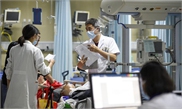China's health authorities have for the first time confirmed cases of the mysterious coronavirus outside of Wuhan, in central China's Hubei Province, where the virus was first detected. The confirmations come amid China's Spring Festival travel rush, and are likely to have an impact on the season.
According to health authorities in Beijing, two cases of the new pneumonia strain were confirmed in the city's Daxing District on Monday. Another case was confirmed on a 66-year-old man in Shenzhen, South China's Guangdong Province, according to the city's health commission.
All three patients are said to be in stable condition and medical inspections are being carried out on those who have been in close contact with the infected individuals.
The three newly confirmed cases come as China is in the middle of its annual Spring Festival travel rush. Between January 10 and February 18, a total of 3 billion trips are expected to be carried out, including homebound trips and travels, according to an estimate from the National Development and Reform Commission (NDRC).
People have been expressing concern online about how the peak travel season may affect the spread of the coronavirus. Some say they have canceled plans which would involve close interactions with crowds, including cinema trips, visiting relatives and traveling abroad.
"Visiting relatives during the Spring Festival is a must in China, and it is considered socially unacceptable to avoid this. But I fear it could speed up the spread of the virus," a Weibo user living in Tianjin told the Global Times.
"I bought a movie ticket for Friday. It is non-refundable but I think it might be a good idea not to go," another user wrote on Weibo.
According to Wang Yuedan, a doctor at the Peking University Health Science Center, large-scale migrations might facilitate the spread of diseases associated with the respiratory tract. However, Wang also noted that based on the current confirmed cases of the virus and the deployment of proactive measures, the impacts of the travel rush on the virus' spread are "under control".


